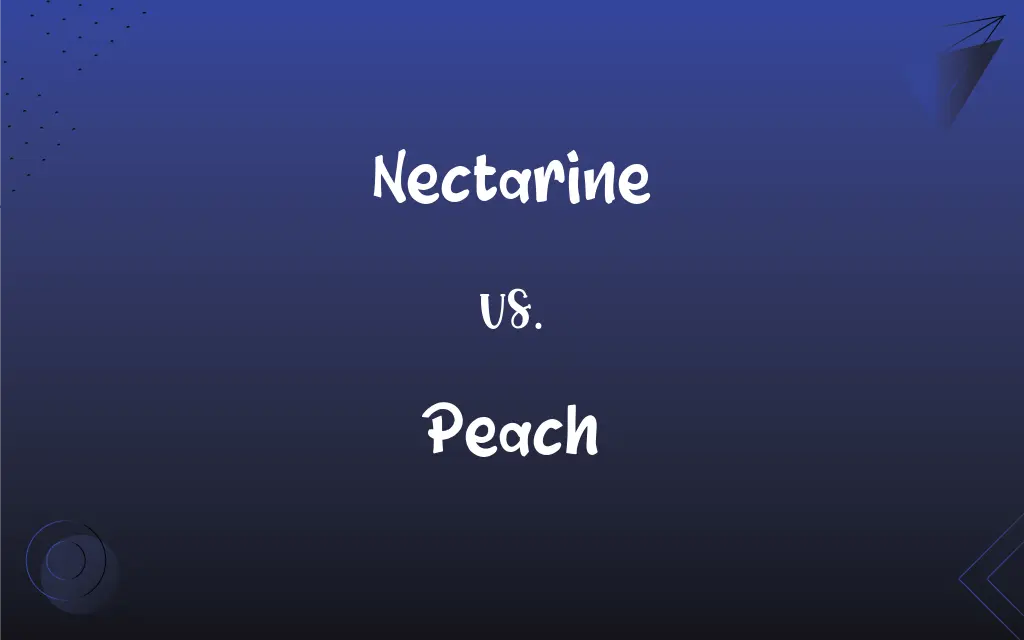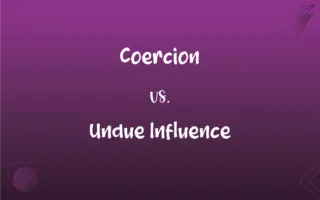Nectarine vs. Peach: What's the Difference?
Edited by Aimie Carlson || By Janet White || Published on March 12, 2024
Nectarines and peaches are both stone fruits from the same species, but nectarines have smooth skin while peaches have fuzzy skin.

Key Differences
Nectarines and peaches are closely related fruits, often causing confusion due to their similar appearance and flavor profiles. However, a key distinguishing feature is their skin texture. Nectarines boast a smooth, shiny skin without the fuzz that characterizes peaches. This difference in texture not only affects the tactile experience of handling these fruits but also influences culinary preferences and uses. Some people prefer the smooth skin of nectarines for fresh consumption, while others enjoy the unique mouthfeel provided by the fuzz on peaches.
Despite the difference in skin texture, nectarines and peaches share a similar flavor and aroma, both offering sweet and sometimes slightly tart notes. The flavor of both fruits can vary depending on the variety and ripeness, with some being sweeter and others more acidic. This similarity in taste makes them interchangeable in many recipes, although the presence or absence of fuzz might affect the preparation method, such as whether to peel the fruit.
The genetic difference between nectarines and peaches is minimal, with the former being the result of a genetic mutation that leads to the absence of fuzz. This mutation is not indicative of any significant nutritional difference between the two, as both nectarines and peaches provide a good source of vitamins, antioxidants, and fiber. The choice between them often comes down to personal preference regarding texture and slight variations in taste.
Cultivation practices for nectarines and peaches are largely similar, as they require comparable climatic conditions and care. Both fruits thrive in temperate regions and are harvested in the summer months. The trees of both fruits are also susceptible to the same pests and diseases, which means that growers must follow similar management practices to ensure healthy crops.
Nectarines and peaches are very much alike in terms of genetic makeup, flavor, and cultivation requirements, the primary difference lies in the texture of their skin. This difference influences consumer choice and culinary uses, making each fruit unique in its own right despite their close relationship.
ADVERTISEMENT
Comparison Chart
Skin Texture
Smooth
Fuzzy
Genetic Mutation
Recessive allele causes smooth skin
Dominant allele for fuzzy skin
Flavor
Sweet with a slightly firmer texture
Sweet with a slightly softer texture
Culinary Uses
Often eaten fresh, can be cooked
Eaten fresh, used in baking and cooking
Nutritional Value
High in vitamins and antioxidants
Similarly high in vitamins and antioxidants
ADVERTISEMENT
Nectarine and Peach Definitions
Nectarine
A stone fruit with a firm, juicy flesh.
The nectarine pie had a delightful balance of sweetness and tartness.
Peach
A symbol of the summer season and its bountiful harvest.
Peach season is my favorite time of the year.
Nectarine
A variant of the peach that lacks the characteristic fuzz.
In the market, nectarines are often displayed alongside peaches.
Peach
The fruit of the Prunus persica tree, characterized by its fuzz.
They decided to plant a peach tree in their backyard for summer harvests.
Nectarine
A fruit known for its vibrant red skin.
The nectarine's bright red hue made it stand out in the fruit salad.
Peach
A fruit with a velvety, fuzzy outer skin and a sweet inner flesh.
He bit into the peach, enjoying the juice that dripped down his chin.
Nectarine
A smooth-skinned fruit of the same species as the peach.
She preferred a nectarine to a peach because of its smooth skin.
Peach
Often used in desserts and jams for its sweet flavor.
Homemade peach jam was their speciality.
Nectarine
A popular choice for fresh eating due to its smooth texture.
For a refreshing snack, she grabbed a ripe nectarine from the fridge.
Peach
A stone fruit known for its soft, aromatic flesh.
The aroma of fresh peaches filled the kitchen.
Nectarine
A variety of peach tree having small aromatic fruit with smooth reddish skin.
Peach
A small Chinese tree (Prunus persica) in the rose family, widely cultivated throughout temperate regions, having pink flowers and edible fruit.
Nectarine
The soft juicy fruit of this tree.
Nectarine
A cultivar of the peach distinguished by its skin being smooth, not fuzzy.
Nectarine
(obsolete) A nectar-like liquid medicine.
Nectarine
Nectarous; like nectar.
Nectarine
Nectareous.
Nectarine
A smooth-skinned variety of peach.
Nectarine
Variety or mutation of the peach bearing smooth-skinned fruit with usually yellow flesh
Nectarine
Smooth-skinned variety or mutation of the peach
FAQs
Can nectarines and peaches be used interchangeably in recipes?
Yes, they can be used interchangeably in most recipes.
Are nectarines genetically modified peaches?
No, nectarines come from a natural genetic mutation within peaches.
How should nectarines and peaches be stored?
Store at room temperature until ripe, then refrigerate to prolong freshness.
Which has more sugar, a nectarine or a peach?
Sugar content is comparable, though it can vary slightly by specific variety.
Is there a taste difference between a nectarine and a peach?
The taste is similar, though some perceive nectarines as slightly firmer and peaches as a bit softer.
Can you eat the skin of both nectarines and peaches?
Yes, both are edible, though personal preference for skin texture varies.
How do you tell if a nectarine or peach is ripe?
They should yield slightly to pressure and have a fragrant aroma.
What's the main difference between a nectarine and a peach?
The skin texture; nectarines have smooth skin, while peaches are fuzzy.
Do nectarines ripen after being picked?
Yes, like peaches, nectarines can ripen after being picked.
What's the peak season for nectarines and peaches?
Summer is the peak season for both fruits.
Are there seedless varieties of nectarines or peaches?
No, both fruits typically contain a single large pit.
Are canned peaches and nectarines nutritionally similar to fresh?
Yes, though fresh is best, canned varieties still offer nutritional benefits.
Are peaches or nectarines more nutritious?
Both offer similar nutritional profiles, including vitamins and antioxidants.
Can people with peach allergies eat nectarines?
No, since they are genetically similar, allergies usually apply to both.
Can nectarines and peaches be frozen for later use?
Yes, both can be frozen, preferably sliced and with pits removed.
Why do some people prefer nectarines over peaches?
Preference often comes down to the absence of fuzz on nectarines.
How long does it take for a peach or nectarine tree to bear fruit?
Typically, 3-4 years after planting.
Do nectarines also come in white flesh varieties like peaches?
Yes, there are both yellow and white flesh varieties of nectarines.
Do nectarines have a shorter shelf life than peaches?
Shelf life is similar, though handling may affect longevity due to skin texture.
Can you grow a peach tree from a nectarine seed, or vice versa?
Yes, but the resulting fruit may not be true to the parent due to cross-pollination.
About Author
Written by
Janet WhiteJanet White has been an esteemed writer and blogger for Difference Wiki. Holding a Master's degree in Science and Medical Journalism from the prestigious Boston University, she has consistently demonstrated her expertise and passion for her field. When she's not immersed in her work, Janet relishes her time exercising, delving into a good book, and cherishing moments with friends and family.
Edited by
Aimie CarlsonAimie Carlson, holding a master's degree in English literature, is a fervent English language enthusiast. She lends her writing talents to Difference Wiki, a prominent website that specializes in comparisons, offering readers insightful analyses that both captivate and inform.































































